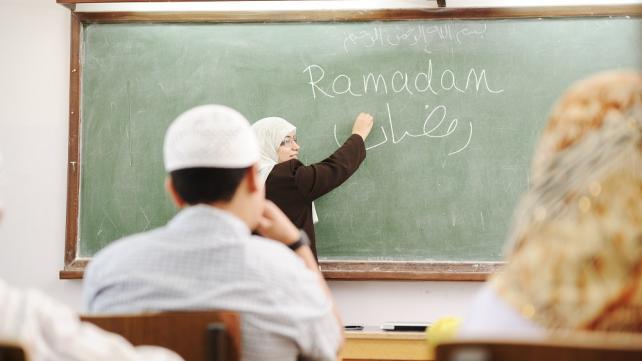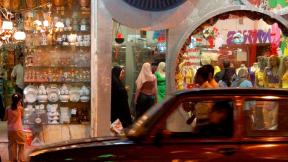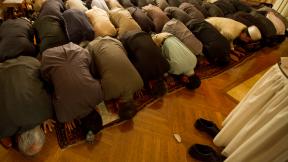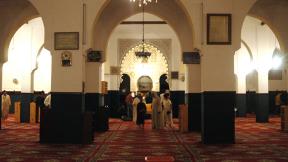
whats ramadan? Ramadan is the month of mandatory fasting for all able adults without valid exemptions. Simply stated, fasting in Ramadan is the act of complete abstaining from food, drink, smoking, and intimate spousal relationships from dawn to sunset everyday for the whole ninth month of the Islamic calendar.
It is culminated in the Night of Power, when the Quran was revealed to the Prophet Muhammad, peace and blessings be upon him, and when all-night worship is equal to that of a lifetime. Ramadan is concluded in the celebration of Eid, when families and the community meet to congratulate each other of a new beginning after a month of soul-searching, worship,and reflection. It is a powerful platform for rebirth of individuals, families, and communities.
However, many observant Muslims forget that beneath the simple definition of fasting lies more complex behavioral expectations. Why would God ask the believers to abstain from life-sustaining necessities and pleasures for a whole month? Is it only to make them hungry and thirsty for His sake so they can prove that they are good believers? Or are there other achievable and beneficial goals?
whats ramadan ? The Quran says clearly speaking about fasting in Ramadan, “God does not want to make it difficult for you but He wants to make it easy”. As in all rituals and acts of worship, there are deeper purposes, or Makased in Arabic. Abstaining from food and drink is only the minimum requirement. Fasting believers are also expected to reflect on the mercy of the month in their daily interactions, behaviors, and relationships.
whats ramadan By changing their daily regimen for a whole month, they are expected to change themselves by breaking bad and harmful habits and quitting any addictions that have crept into their lives in the other 11 months of the year. Breaking bad habits is not easy, but Ramadan gives us a whole month to do so. God invites us in Ramadan to exert our effort to change ourselves, our families, and our community by embracing a simple paradigm: If you are able to abstain from what is lawful and life-sustaining, i.e. food and water, shouldn’t you be able to abstain from what is harmful and unnecessary?
Early believers probably understood the deep purposes of fasting intuitively, as they wholeheartedly embraced their faith. With time, and not unlike other religions, Islam and its rituals became more cultural practices than a fully embraced and understood way of life. Muslims, or the majority of them, focused on the acts of worship, not on the substance, and on the "how", not on the "why". When it comes to Ramadan, we tend to trivialize our fasting by indulging in acts and practices that run counter to the very essence of the month.
Here is a short list of trends and practices that are counterproductive to the essence and purpose of fasting. You have the whole month to cleanse yourself from them:
1. Arguing over the Hilal or moonsighting.
The Islamic, or Hijri, year, like the Jewish year, is based on the lunar calendar. The lunar year is about 11 days shorter than the Gregorian year, and that is why Ramadan keeps moving earlier and spans all seasons.
Ramadan is the ninth month of the Islamic year. The lunar month starts by the birth of a new moon. The birth of a new moon can be determined by moonsighting by naked eye, telescopes, or by scientific calculations. The beginning of the month may be different from country to country based on geography. The majority of Muslim scholars are with the opinion that Muslims, living in one country or throughout the world, should start and end the month together.
But some disagree and follow other criteria with varying degrees of flexibility or rigidity. Many Muslims spend hours arguing whether Ramadan started or ended based on which criteria, often with minimal knowledge of the topic. Don’t waste time arguing about this issue. Leave it to the experts. Instead, focus on starting your month on a strong footing. Set certain achievable goals for you and your family. Learn something that may benefit yourself and your community and avoid the unnecessary knowledge.
2. Overeating and indulging in food, drinks, and sweets.
Fasting should teach us self-control and discipline over our bodies and over what we consume. We should eat in moderation after breaking the fast and try to lose some weight. Focus on nutritious, not junk, fatty, or high calorie food. Eat local, seasonal, Halal, wholesome and green.
Learn how to cook and eat healthy. Exercise after Iftar. A brisk walk is good exercise even for 30 minutes every night. Taraweeh prayer is also good exercise. We have an epidemic of obesity and the epidemic of the "fattening of America,”. At least 66 percent of adults are overweight or obese and there is a compelling argument to be made that we should eat less, lose weight, and be more conscious of our health.
The Prophet Muhammad, God's peace and blessings be upon him, taught us moderation and self-control in all aspects of life, and forbade us to harm ourselves, others, or nature.
3. Doing what is harmful.
The concept of sin, or Haram, in Islam includes all what can harm self, family, community, or nature. In general, actions are permissible unless there is credible and corroborated evidence of otherwise. Intentional eating and drinking will definitely nullify the physical part of fasting, but there are other deeds and behaviors that will undermine the essence of fasting rendering the physical part meaningless.
Ramadan is your chance to avoid harm to your body, mind, faith, family, wealth, community, and Earth. How about quitting smoking and other addictions? How about mending the relationships with your close and extended family members?
4. Cheating, lying, backbiting, gossiping, slandering, false accusations, or spreading rumors.
Social media has made it easy to spread all kind of rumors and falsehoods. Quitting the pleasure of tasting food and water is the minimum of fasting, but what is more important is quitting what may ruin relationships and weaken ties within your family and the community. Those who lie and hurt other people while fasting gain nothing but thirst and hunger. Backstabbing, gossiping, and spreading falsehood is likened to the eating of flesh of a cadaver in the Quran.
5. Increased consumption, waste, and overspending.
Fasting is not an excuse for wasting too much food or overspending. If anything, it is a time for saving on your meals and spending on others’ meals. Feed the poor and the refugees, invite relatives and friends, but do not show off or compete in overspending. As it turns out, we waste an incredible amount of food - an estimated 27 percent of food available for consumption - and it happens at the supermarket, in restaurants, in cafeterias, and in our very own kitchens. That breaks down to about a pound of food for every American, wasted every single day. If we can cut down our calories, why not cut down our carbon production?
We are created to take care of the Earth not to take over it and ruin it. Make your Ramadan “green” by reducing your carbon footprint. Calculate your footprint in the beginning of the month and set realistic goals to shrink it by the end of the month? Global warming can be dampened by replacing your light bulbs by LED, using high efficiency appliances and reducing fossil fuel consumption. Invest in fuel-efficient or electric vehicle and carpool to the Masjid.
6. Laziness and oversleeping.
Fasting is not meant to disrupt work or change your circadian rhythm. Some people use fasting for not working, and they don’t feel motivated to perform their daily routines. Some countries slow down significantly during Ramadan. That is not consistent with the tradition of the Prophet. Don’t change your work schedule. Pray Taraweeh after Iftar, and sleep for six to seven hours at night. Beware of sleep deprivation or oversleeping. Both are harmful. A power nap in the afternoon is a good idea, but don’t nap more than 30 minutes unless you are sleep deprived. The five calls for ritualistic prayer remind Muslims to get up early in the day and succeed in work, so get busy working even if you are fasting.
Wasting time by watching TV, playing video games, and browsing social media. Social media has became the new addiction. We spend an average of four-and-a-half hours every day watching TV. Adults in the United States devote about 10 hours and 39 minutes each day to consume media, including our tablets, smartphones, personal computers, multimedia devices, video games, radios, DVDs, DVRs and TVs.
In Muslim-majority countries, TV channels compete in showing their best programs during Ramadan. There is nothing wrong in watching media in moderation. But time is precious. If people are spending over 50 hours a week with media for entertainment purposes, then there's really no time left for any of the other things we value. Too much screen time and other inactive behaviors have also been linked to the risk of obesity, especially in children. So this Ramadan, throw out those extra screens, and don't put one in your bedroom. Learn to shut down the iPads and smartphones before you go to sleep and limit the use. Read one or two books. It is much more rewarding.
7. Forgetting the poor.
Ramadan is not an excuse for inviting the wealthy while ignoring the poor. One of the main purposes of fasting is to identify with those who don’t have the means to have three meals or even one meal daily. One billion people on earth suffer from hunger and about 50 million people in the US suffer from food insecurity- a five-fold jump since the late 1960s. When you plan Iftars, remember to invite those who are usually forgotten. Invite the less privileged among your family members, neighbors, and the refugees. Volunteer to feed the homeless in your city's soup kitchens. Make a plan to visit a few refugee families in Ramadan. There are 18,000 Syrian refugees who were resettled among us in the past two years, among them about 150 families in the Chicago area. Iftar is for the family to eat together, and Taraweeh is for the community to come together.
8. Getting angry, insulting others and losing control.
Self-control is one of the main goals of fasting. It is probably a very effective method to sharpen our tools and increase our resilience. By improving our resilience, we are better equipped to deal with stress.
That is why fasting was prescribed and practiced in many faith traditions. Fasting should make us humble, down to earth, kind, and compassionate. Ramadan should teach us patience and tolerance when we are insulted or provoked. It is not an excuse for venting or violence. If you have a problem with anger, fasting might be one of the tools to manage it. Like other communities, Muslims are not immune from domestic violence. If you have a problem with domestic violence, Ramadan may be the best time to address this disease and seek professional help. There are many resources in the community. The Prophet Muhammad, peace and blessings be upon him, said “Whoever dignified women, he is dignified and whoever insulted them, he is not”.
9. Reading of the Quran without understanding.
Ramadan is called the month of the Quran, the Divine Book that was revealed to the Prophet Muhammad, peace and blessings be upon him, over 23 years. The Quran was rehearsed in totality by the Prophet in the month of Ramadan in the last year before he died. Muslims dedicate time every day for reading the Quran. They listen to it in the Taraweeh nightly prayers after breaking the fast. They are instructed to reflect on and ponder about its verses.
Like other Divine texts, it has to be comprehended before it can be implemented. Recent trends in Masjids and Islamic schools are to focus on recitation and memorization of the Quran at the expense of proper knowledge. Proper understanding requires mastery of the Arabic language, its grammar and metaphors, the reasons and purposes of certain verses, their historical context and order, how the Prophet and his Companions reacted to the revelation, and how they applied it in their lives. It is also important to know what is abrogated and what is not, what is general and what is specific, or what is termed the sciences of Quran.
The abhorrent interpretation of certain verses of the Quran by ISIS, Boko Haram, Al-Qaeda and other violent groups, stem from the disconnection between the understanding of the text and its context. These groups, not unlike the Kharijites hundreds of years before them, apply certain texts in situations that do not meet the scholarly understanding of the text. Their extremist ideology, targeting the youth, the new converts, and the vulnerable, is very harmful to Islam and to humanity. It masquerades itself as credible Islamic ideology, but it is not.
Spend time in Ramadan with your children and discuss with them some of these difficult issues. Listen to them carefully and don’t disregard their concerns. Young Muslims are increasingly bullied in schools and are under intense pressure by their peers and the media. They have to feel comfortable to speak freely to their families. Ask local scholars if you are faced with difficult questions.
We must raise the bar this Ramadan and make it a month of positive behavioral and communal change. Quitting eating and drinking from dawn to dusk is only the first step, but what follows is even more significant.








Add new comment